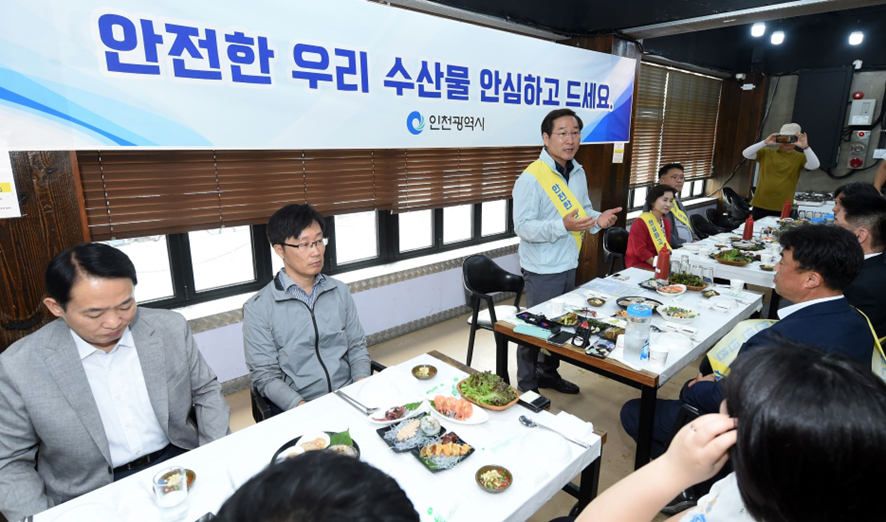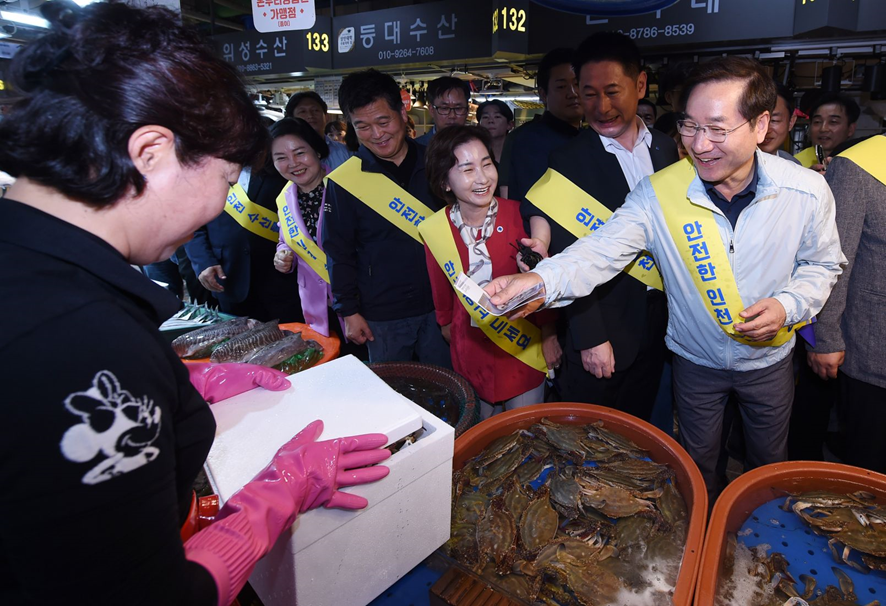- Mayor visits Soraepogu Fish Market to inspect how the market keeps its seafood safe and to encourage the consumption of seafood -
- Incheon will expand the scope of its radiation testing, focus on cracking down fake origin labels, offer special discounts, and open a direct-to-consumer market -
Incheon Mayor Yoo Jeong-bok visited the Soraepogu Traditional Fish Market in Namdong-gu on August 27 to ensure the safety of locally traded seafood. He also promised prompt and thorough radiation testing and other support to prevent the general public from cutting down on their seafood consumption.
The Mayor headed down to the Soraepogu Fish Market to just how safe the market keeps its seafood and met with local seafood business owners as part of the City’s drive to allay any concerns over the safety of local seafood given Japan’s decision to discharge contaminated water from its Fukushima nuclear power plant on August 24 and also to gather feedback from locals.

<Inspecting the safety and promoting the consumption of local seafood>

<Inspecting the safety and promoting the consumption of local seafood>
As part of a preemptive strategy to keep seafood safe, Incheon established a task force exclusively assigned to devise safety measures for local seafood and has worked with the fishery product safety countermeasure team with the Incheon Fisheries Technology Support Center, Institute of Health and Environment, the special judicial police, and local counties and districts under its jurisdiction since 2021 when the Japanese government announced its decision to discharge water from Fukushima.
The Incheon Fisheries Technology Support Center plans to increase the number of radiation testing before distributing fishery products to 200 by the end of the year, and also promote a new pilot project - “Safe Seafood Town” project - to conduct radiation inspections more thoroughly at the farm-level.
Meanwhile, the Gyeonggi Province Institute of Health and Environment plans to open an on-site inspection office for fisheries products at coastal wharves, which will be equipped to inspect aquatic products at the wholesale-level and increase the number of fisheries products being tested for radiation at large supermarkets and fish markets to 600 this year. To do so, the Institute is looking to increase the number of radiation testing equipment from two to five units. Testing results will be disclosed on the websites of each institution (Incheon Fisheries Technology Support Center, Institute of Health and Environment).
Moreover, Incheon to open an observation program where citizens can directly view the entire radiation testing process, from sample collection to analysis, in order to relieve anxiety and increase the public's confidence in local seafood. Over a 3-week period, starting on August 14, the City is also conducting special inspections at traditional markets and supermarkets to make sure vendors are displaying labels and origins properly for seafood products imported from Japan.
To help prevent public confidence in seafood from dropping any further, Incheon will offer discounts on purchases made in traditional fish markets across Incheon using the Onnuri Gift Card for Chuseok and Seollal, and discounts for the new direct-to-consumer seafood market (October).
Mayor Yoo Jeong-bok said, “Incheon and all of its counties and districts will do their best to support locals, fishermen, and seafood vendors by actively promoting the fact that our local seafood is safe.” He added, “Based on scientific evidence, our seafood is more than safe enough to consume.”